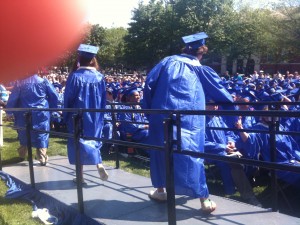This is cross-posted at Cooperative Catalyst.
Yesterday my two youngest children graduated from high school.
Unlike many of the parents cheering and hollering on the lawn on that beautiful June day, I was not deeply grateful to the institution that had just processed them through four years of standardized testing, sorted and tracked them, assessed their “readiness” for honors and AP courses, carefully measured them in relation to their peers and recommended them to colleges and universities. I was not moved to tears by the speeches of various deans, assistant headmasters and superintendents, who in applauding graduates on a job “well done” were also justifying their own continued employment and reinforcing their own sense of self worth, while making the audience complicit in a culture that is passionately attached to competitive, individualized, high-status attainment. I did not feel moved to chuckle at the small-bore insider jokes among administrators about who’s now allowed to have a doughnut, who’s leaving whom by retiring, and who had planned to ride into graduation on a horse and in cowboy boots.
Instead, I had a cautious, wary, somewhat dispassionate view of the institution through which my children had just passed, one filled with the paradoxes that currently characterize my relationship with the educational sector. Graduations are ceremonies of self-congratulation, moments when the fierce need for institutional justification are most nakedly on display, and when the educational values of Darwinian selection are reified and reinforced, while at the same time paradoxically, the net is cast wide and we are all one big happy family. In the high school graduation ritual, some are chosen especially, while simultaneously, through the apparent generosity of diploma awarding, another symbol of institutional branding and enfolding, all differences are momentarily forgiven, all past arguments, family squabbles and formerly serious infractions are set aside, at least for a few glowing weeks until it all starts back up again.
At this high school, and throughout their years in public school, these two children have had some extraordinary individual teachers, teachers who are fierce and quirky and kind and powerfully interested in things. By virtue of a small, democratically-run academic program within their conventional, high-attainment upper-middle-class public high school, these children have had opportunities to develop as writers, critical thinkers, and social activists. Without that, I think they might have been crushed on the rocks of conventional high school culture, or certainly ground down to a finer grain of quarry stone. This little program acted as a breakwater within an institution in which students are fodder, to be processed and spat out, to be hazily remembered at alumni events if they do well, but mostly forgotten–like the many thousands of students who have passed through its halls and out its doors. For the teachers with whom my children came into contact during their four years of high school who saw them as unique, uniquely passionate, and beautiful young people, I am profoundly grateful.
On the other hand, the larger school culture in which those relationships occurred was one that tended, even among the most enlightened, to prize intellectual performances that accrue towards building academic capital: grades, test scores, prizes, and an extraordinary number of extracurriculars. Consumed by its own (adult) dramas and desire to protect its sense of specialness (a liberal, “diverse,” mostly White, meritocracy), the institution would go to dramatic ends to describe its wonders to the outside world: constantly highlighting its “inclusive” culture while looking the other way at class and race incidents and enrollment patterns; proclaiming its high test scores while also purporting not to be test-obsessed; reinforcing among teachers that they were the best of the best, but rarely holding them accountable for their classroom practices or engaging them in serious professional development. My children were often bored. In her AP Environmental class in senior year, my daughter bemoaned four lost weeks at the end of the year spent preparing for the AP exam (high scores are very important to teachers and help determine teacher status); she loved the material but, “learning just stopped, even though most of us could already get a 4 or a 5 on the test.” Long ago my son determined exactly how not to let the institution of school get in the way of his learning, and had explicit plans for choosing courses carefully so that he had ample time to attend local university lectures and participate in arts events. Both have come through the institution with real interests intact, but each has wasted a tremendous amount of time in high school. Finding intellectual challenges primarily in those classes that were a part of their small democratically-run program, they learned little of great consequence except how to tolerate the endless sea of demands and counter-demands of performance that the large comprehensive high school requires, and how to shoot the rapids of an institution like school without swamping the boat. They are out, and I am glad they are out. I am relieved.
My children are White, upper-middle-class, and amply provided for. The system in which my kids go to school is set up to make kids like them feel very special and successful. They are not “school dependent,” in the words of my new friend Yvette Jackson, the author of The Pedagogy of Confidence. Unlike so many kids with whom I work, my children did not have to rely on their school system to ensure their success. And yet, high school should and could have been so much better, for them and for all kids. I am not relieved.



Recent Comments